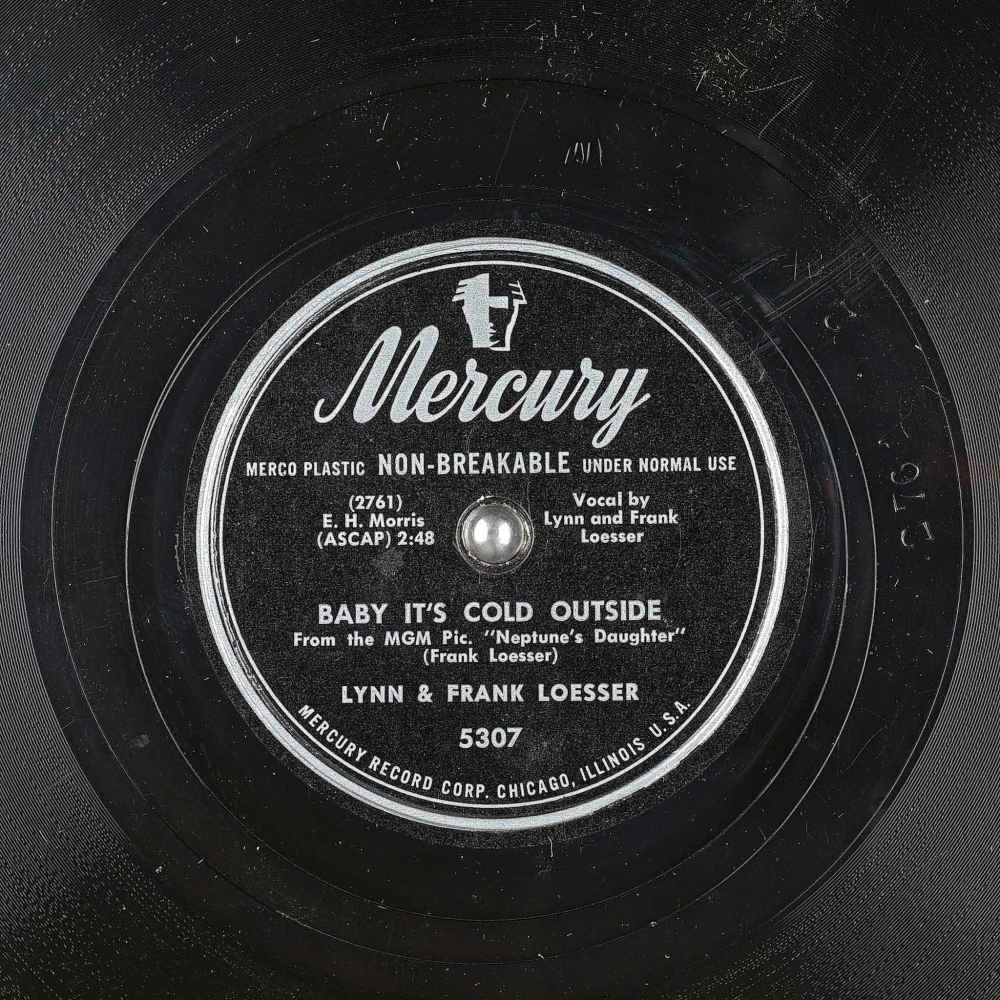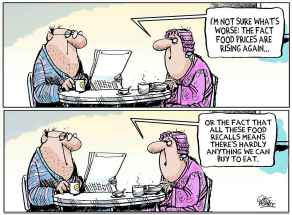Banning controversial songs is a tone-deaf solution Let's have a discussion about Baby, It's Cold Outside, instead of simply removing it from the airwaves
Read this article for free:
or
Already have an account? Log in here »
To continue reading, please subscribe:
Monthly Digital Subscription
$0 for the first 4 weeks*
- Enjoy unlimited reading on winnipegfreepress.com
- Read the E-Edition, our digital replica newspaper
- Access News Break, our award-winning app
- Play interactive puzzles
*No charge for 4 weeks then price increases to the regular rate of $19.95 plus GST every four weeks. Offer available to new and qualified returning subscribers only. Cancel any time.
Monthly Digital Subscription
$4.99/week*
- Enjoy unlimited reading on winnipegfreepress.com
- Read the E-Edition, our digital replica newspaper
- Access News Break, our award-winning app
- Play interactive puzzles
*Billed as $19.95 plus GST every four weeks. Cancel any time.
To continue reading, please subscribe:
Add Free Press access to your Brandon Sun subscription for only an additional
$1 for the first 4 weeks*
*Your next subscription payment will increase by $1.00 and you will be charged $16.99 plus GST for four weeks. After four weeks, your payment will increase to $23.99 plus GST every four weeks.
Read unlimited articles for free today:
or
Already have an account? Log in here »
Hey there, time traveller!
This article was published 07/12/2018 (2588 days ago), so information in it may no longer be current.
Along with sipping egg nog and trimming trees, Canadians engaged in another reliable holiday tradition this week: debating whether or not Baby, It’s Cold Outside promotes date rape.
About the song
Baby, Its Cold Outside has been considered a holiday classic ever since it won the Academy Award for best original song in the1949 film “Neptune’s Daughter.” Turner Classic Movies describes the plot of the film as: “mistaken identity complicates a polo player’s romance with a bathing suit designer.”
Eight recordings of the duet by different artists were released in 1949, and it’s been recorded by more than 50 duos since then.
Here’s the scene in which the song is sung:
On Tuesday, three of the country’s major broadcasters — CBC, Rogers and Bell Media — announced they’d be putting the chill on the contentious duet, written by American songwriter Frank Loesser in 1944, and would not be playing it on their radio stations this year.
Several American radio stations have also put the song on their naughty lists, arguing it has no place in the #MeToo era.
Through a modern lens, it’s not hard to see how some people might view this song as a woman being pressured into sex by a guy who won’t take no for an answer.
And the lyric, “Say, what’s in this drink?” — penned decades before an entire generation of women were taught to vigilantly guard their cocktails — is absolutely tone-deaf by 2018 standards, especially if you have even a passing familiarity with the Bill Cosby case.
But banning Baby, It’s Cold Outside entirely? That seems oddly reactionary.
While I’m sure people have had this “fun debate” on Facebook and at their work holiday parties, it’s not as though droves of people were picketing radio stations demanding the song’s removal. People seem more outraged by the ban than the song.
Before you blame feminists for ruining Christmas, there’s plenty of feminist analysis out there arguing that the song is actually a sly, ahead-of-its-time comment on slut-shaming and sexist double standards.
Here’s the theory: in the era in which the song was written, good unmarried girls — always girls, never women — with reputations to protect didn’t stay over at men’s houses. And if you listen to the lyrics, the woman wants to stay; she’s just concerned about what everyone else thinks.
Before you blame feminists for ruining Christmas, there’s plenty of feminist analysis out there arguing that the song is actually a sly, ahead-of-its-time comment on slut-shaming and sexist double standards.
“He’s providing her with a list of cover stories, essential excuses she can use to explain why she hasn’t or won’t go home,” the blogger Slay Belle writes in a much-cited defence of the song. “It’s cold out, it’s snowing, the cabs aren’t running, the storm is becoming a blizzard, she might get hurt trying to get home.”
Read the lyrics
The song’s parts are assigned to “The Mouse” and “The Wolf,” rather than male and female singers — though most recordings over the years have The Mouse sung by a woman and The Wolf by a man.
The song’s parts are assigned to “The Mouse” and “The Wolf,” rather than male and female singers — though most recordings over the years have The Mouse sung by a woman and The Wolf by a man.
In the text below, the part of The Wolf is indicated by parentheses.
[Verse 1]
I really can’t stay
(But baby it’s cold outside)
I’ve got to away
(But baby it’s cold outside)
This evening has been
(Been hoping that you’d drop in)
So very nice
(I’ll hold your hands, they’re just like ice)
My mother will start worry
(Beautiful what’s your hurry)
My father will be pacing the floor
(Listen to the fireplace roar)
So really I’d better scurry
(Beautiful please don’t hurry)
But maybe just a half a drink more
(Put some records on while I pour)
The neighbors might think
(Baby it’s bad out there)
Say, what’s in this drink
(No cabs to be had out there)
I wish I knew how
(Your eyes are like starlight now)
To break this spell
(I’ll take your hat, your hair looks swell)
I ought to say “No, no, no sir”
(Mind if I move in closer?)
At least I’m gonna say that I tried
(What’s the sense in hurtin’ my pride?)
[Chorus]
I really can’t stay
(Oh, baby don’t hold out)
Baby it’s cold out side
[Verse 2]
I simply must go
(But baby it’s cold outside)
The answer is no
(But baby it’s cold outside)
Your welcome has been
(How lucky that you dropped in)
So nice and warm
(Look out the window at the storm)
My sister will be suspicious
(Gosh your lips look delicious)
My brother will be there at the door
(Waves upon the tropical shore)
My maiden aunt’s mind is vicious
(Gosh your lips are delicious)
But maybe just a cigarette more
(Never such a blizzard before)
I’ve gotta get home
(But baby you’d freeze out there)
Say, lend me a comb
(It’s up to your knees out there)
You’ve really been grand
(I thrill when you touch my hand)
But don’t you see?
(How can you do this thing to me?)
There’s bound to be talk tomorrow
(Think of my lifelong sorrow)
At least there will be plenty implied
(If you got pneumonia and died)
[Chorus]
I really can’t stay
(Get over that old out)
Baby it’s cold
Baby it’s cold outside
The offending line — “Say, what’s in this drink?” — is also a relic from another time. As Belle points out, it was often deployed in screwball comedies from that era as an excuse for out-of-character behaviour — the punchline being, of course, that there’s nothing in that drink.
So, it’s not that the dude spiked her drink, it’s that the girlfriend wants to get her freak on in front of a roaring fire but doesn’t want people to think she’s a bad girl. It’s vintage speak for “I don’t normally do this, but…”
Thinking is hard, though. It’s much easier to just ban the thing and feel like you’re on the side of the angels at the same time.
In her essay collection Feel Free, British writer Zadie Smith recalls a dinner party at which she and her friends were bemoaning young lefties and their tendency to censor or silence opinions they view as being “wrong.”

Her friend wisely pointed out that this was learned behaviour from Smith’s generation: “We always wanted to be seen to be right. To be on the right side of an issue. More so even than doing anything. Being right was always the most important thing.”
I actually had just read that paragraph when this whole debate erupted, and it resonated. After all, how much is the Baby, It’s Cold Outside ban about appearances?
The fact that some radio programmers are passing this off as some sort of show of solidarity with the #MeToo movement is weak, and it cheapens the movement. Which, for the record, is about holding powerful men to account, not holding holiday songs from 1944 to 2018 standards.
The fact that some radio programmers are passing this off as some sort of show of solidarity with the #MeToo movement is weak, and it cheapens the movement. Which, for the record, is about holding powerful men to account, not holding holiday songs from 1944 to 2018 standards.
We live in a time of on-demand outrage, and it can be difficult to know how, when and if to respond — and what’s even being responded to. At this pace, responding can often mean going for the lowest-hanging fruit — such as banning a holiday duet from the 1944 — because it gives the illusion of “doing something.”
That doesn’t mean we shouldn’t be critical of what we consume. We should absolutely be critical about the media we consume.
But it’s pretty hard to exercise critical thinking muscles — which are becoming rather atrophied as it is in an era long on misinformation and short on attention spans — if we just ban the thing.
Many romcoms of a certain vintage, for example, depict stalking as a romantic activity. But the solution isn’t to ban those movies. The solution is to discuss these tropes and find out why they are harmful and, hopefully, learn from them.
To that end, actress Molly Ringwald penned a powerful essay in the summer for the New Yorker reconsidering, in the age of #MeToo, the John Hughes classics she starred in during her youth. Not once does she advocate for a ban of The Breakfast Club or Sixteen Candles. Instead, she hopes they endure.
“The conversations about them will change, and they should. It’s up to the following generations to figure out how to continue those conversations and make them their own — to keep talking, in schools, in activism and art — and trust that we care.”
It’s also important to keep some perspective. Baby, It’s Cold Outside is being banned from some radio stations, not from existence. You can listen to that song whenever you want. You can only listen to that song, if you want. And you will hear it hundreds of times this month, and I know this because I’ve been inside a mall in December.
And if radio stations must ban a holiday song, ban Paul McCartney’s Wonderful Christmastime on the grounds of being a terrible, diabolical earworm.
jen.zoratti@freepress.mb.ca Twitter: @JenZoratti

Jen Zoratti is a columnist and feature writer working in the Arts & Life department, as well as the author of the weekly newsletter NEXT. A National Newspaper Award finalist for arts and entertainment writing, Jen is a graduate of the Creative Communications program at RRC Polytech and was a music writer before joining the Free Press in 2013. Read more about Jen.
Every piece of reporting Jen produces is reviewed by an editing team before it is posted online or published in print – part of the Free Press‘s tradition, since 1872, of producing reliable independent journalism. Read more about Free Press’s history and mandate, and learn how our newsroom operates.
Our newsroom depends on a growing audience of readers to power our journalism. If you are not a paid reader, please consider becoming a subscriber.
Our newsroom depends on its audience of readers to power our journalism. Thank you for your support.












